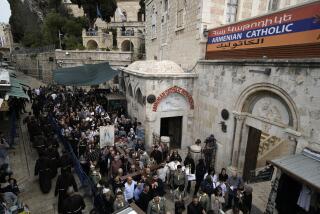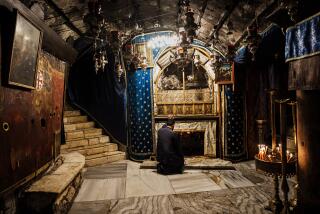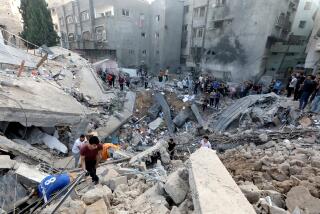Iraq’s war on Christians
- Share via
As much of the world once more prepares to celebrate the birth of Christ, it is a melancholy fact that many of the most ancient churches established in his name are being pushed to the brink of oblivion across the region where their faith was born.
The culprits are Salafist Islam’s increasingly virulent intolerance, the West’s convenient indifference and, in the case of Iraq, America’s failure to make responsible provisions to protect minorities from the violent disorder that has persisted since the U.S.-led invasion in 2003.
When America intervened to overthrow Saddam Hussein, Iraq’s Christians — mostly Chaldeans and Assyrians — numbered about 1.4 million, or about 3% of the population. Over the last seven years, more than half have fled the country and, as the New York Times reported this week, a wave of targeted killings — including the Oct. 31 slaying of 51 worshipers and two priests during Mass at one of Baghdad’s largest churches — has sent many more Christians fleeing. Despite Prime Minister Nouri Maliki promises to increase security, many believe the Christians are being targeted not only by Al Qaeda in Iraq, which has instructed its fighters “to kill Christians wherever they can reach them,” but also by complicit elements within the government’s security services.
The United States, meanwhile, does nothing — as it did nothing four years ago, when Father Boulos Iskander was kidnapped, beheaded and dismembered; or three years ago, when Father Ragheed Ganni was shot dead at the altar of this church; or two years ago, when Chaldean Catholic Archbishop Paulos Faraj Rahho was kidnapped and murdered; as it has done nothing about all the church bombings and assassinations of lay Christians that have become commonplace over the last seven years.
The human tragedy of all this is compounded by the historic one. The churches of the Middle East preserve the traditions of the Apostolic era in ways no other Christian rites or denominations do. The followers of Jesus were first called Christians in Antioch Syria, and it was there that the Gospels first were written down in Koine Greek. For 1,000 years, the churches of Iraq and Syria were great centers of Christian thought and art. Today, the Christian population is declining in every majority Muslim country in the region and is under increasingly severe pressure even in Lebanon, where it still constitutes 35% of the population.
Putting aside America’s particular culpability in Iraq, the West as a community of nations has long turned a blind eye to the intolerance of the Middle East’s Muslim states — an intolerance that has intensified with the spread of Salafism, Islam’s brand of militant fundamentalism. Our ally Saudi Arabia is the great financial and ideological backer of this hatred. In fact, when it comes to religion, the kingdom and North Korea are the most criminally intolerant countries in the world.
Oil and geopolitics prevent the United States and Western European countries from speaking out against what amounts to genocide, though something more sinister than self-interest also is at work. The soft bigotry of minimal expectation is in play, an unspoken presumption that Muslim societies simply can’t be held to the same standards of humane, rational and decent conduct that govern the affairs of other nations.
Paradoxically, the one country in the Middle East whose Christian population has grown in recent years is Israel, where more than 150,000 Christians enjoy religious freedom. That lends a particular pathos to the way in which the current persecution of Christians mirrors that which destroyed most of the region’s ancient Jewish communities following Israel’s establishment in 1948. Iraq, for example, was home to one of the Mideast’s largest and most vibrant Jewish populations, one that predated Christianity by many centuries. It was in the great Jewish academies along the Euphrates that the more authoritative of the two Talmuds was argued out and compiled after the Second Temple’s destruction. All that was swept away in a wave of hatred, as were all but vestiges of the equally ancient Jewish communities in Morocco, Egypt, Yemen, Syria and, more recently, Iran.
As one of the recent Christian refugees from Baghdad told the New York Times this week, “It’s exactly what happened to the Jews.”
A world still dazed and distracted by a world war’s aftermath stood by and did nothing then. The West has no such excuse now.
More to Read
Sign up for Essential California
The most important California stories and recommendations in your inbox every morning.
You may occasionally receive promotional content from the Los Angeles Times.













